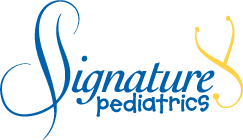By our Smarty friends at Signature Pediatrics
Rice cereal, egg white vs yolks, gluten, dairy, peanut butter, “baby-led weaning”— controversies and changes in feeding recommendations over the past few years have caused some confusion over the best way to start solid foods in infants. Let’s start by saying we all agree that babies need to be fed! It’s the what and when that seems to be ever-changing.
A brief review of feeding practices in the past century reveals that in the early 1900’s many infants weren’t fed solid foods until almost a year of age, and green vegetables were sometimes not introduced until age 3! In the 1930’s 4-6 months of age was recommended for starting baby food, and by the mid 1960’s the age of solid food introduction had steadily decreased to the point that 80 % of infants had already started cereal by 1 month of age.
So, what are the most current recommendations?
They are relatively straightforward and simple, and unlike many things these days the “rules” have even relaxed a bit!
Timing: Solid foods should be introduced between 4 and 6 months of age.
Breast milk or formula alone provides sufficient nutrition for most infants until 4-6 months of age. It takes until about 4 months of age for the intestinal and kidney systems to mature enough to process other foods, and by this age most infants have developed the skills to accept and swallow a food.
Infants should be moved to lumpy or semisolid foods by 8-10 months of age, and can self- feed by this age. There is some evidence that sticking to purees for too long and failing to introduce lumpy solid foods by this age is associated with an increased risk of feeding difficulties and reduced consumption of important food groups such as fruits and vegetables later on.
Food Choices: Here’s where things have gotten easier—it doesn’t matter what food you give your baby as long as the food does not pose a choking risk. (Foods must be of the appropriate texture and consistency for the baby’s developmental should not include nuts, popcorn, raw veggies, whole grapes, chunks of meat or cheese, etc.)
You may start with an iron-fortified baby cereal, fruits, vegetables or even pureed meat. There are no foods to be routinely avoided in the first year of life except for honey due to the risk of infant botulism. It turns out that delaying introduction of common food allergens such as nut products, fish, shellfish, egg white, dairy, wheat or soy beyond 4 months of age as was previously recommended does not help prevent allergies to these foods. In fact, studies on peanut have shown that introducing peanut protein at 4-6 months helps protect against the development of peanut allergy. (Check with your doctor before introducing peanut products to your child if there is a strong family history of peanut allergy or your baby has severe eczema or egg allergy as these babies should be tested first.) This does not mean you must give your baby peanut butter at 5 months of age, but you do not need to wait until 1 or 2 years of age as was previously recommended.
Whether you choose to puree foods and feed with a spoon, or start your baby off with self-feeding soft foods as in the baby-led approach is also up to you. Some infants may do better with one method or the other. The key with either method is to supervise feedings, and pay attention to your baby’s cues about when they are hungry or full. Introduce one new food at a time and wait a few days before adding another new food so you know if your baby has a reaction to a food. Don’t add salt or sugar, offer a variety of tastes and textures, and have fun!
Why Concierge Pediatrics?
Concierge pediatrics is a better approach to health care because the focus is on the patient. Our goal is to allow you to meet with your pediatrician in a pleasant, relaxed and unhurried environment. This provides plenty of time to ask all of your questions and discuss your child’s specific needs. We want you to feel like family so we treat you like family.
With Signature Pediatrics you will always be able to bring in a sick child to be seen on the same day and can schedule most other appointments on the same day or within 24 hours. Wait times have been greatly reduced or eliminated and you will experience little or no time in the waiting room. Even more importantly, once you’re with the doctor, there’s no rush. We will take the time to truly understand your child’s unique needs and offer the most thorough care and follow-up possible.
Please contact us today and learn how Signature Pediatrics can mean the difference between your child living and living well.
![]()
Signature Pediatrics
6115 Park South Dr. • Suite 105
Charlotte, NC 28210
Phone 704-944-8388
Fax 704-944-8389
Website



